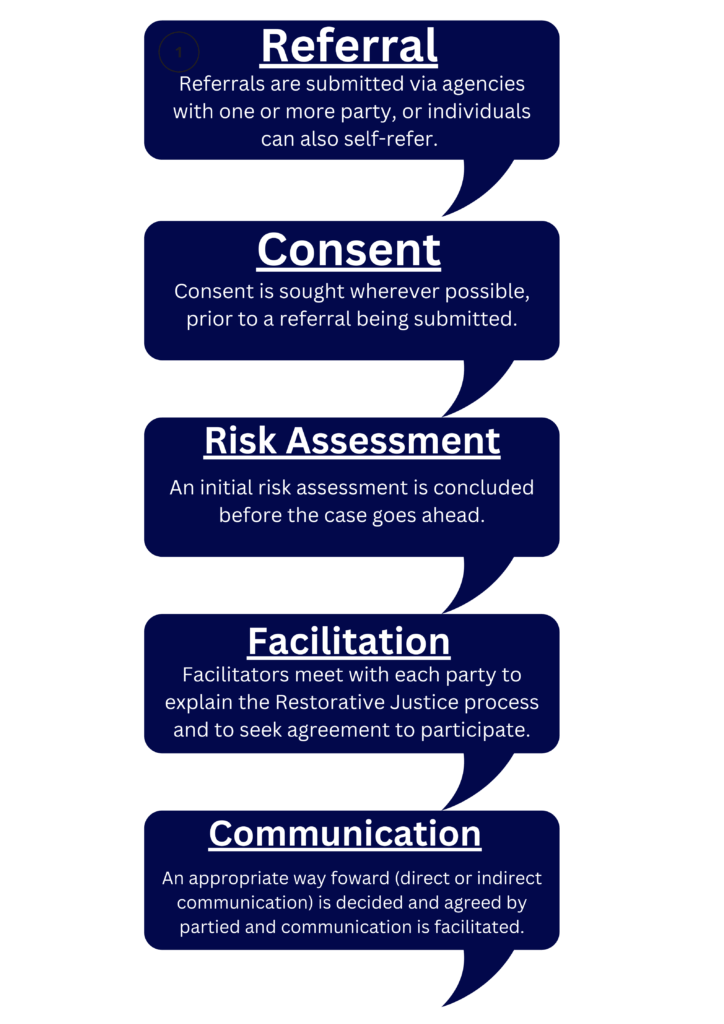Bedfordshire Police Headquarters
Bridgebury House, Woburn Road, Kempston, Bedfordshire, MK43 9AX
Bridgebury House, Woburn Road, Kempston, Bedfordshire, MK43 9AX
Restorative Justice (RJ) is a facilitated, safe and structured communication between a person who has been harmed (victim) and the person who caused the harm (offender). This communication can be direct (a face-to-face meeting) or indirect (through letters, videos, audio, messages) or a mixture/several of these – whichever each party agrees to and does not put either party at risk of further harm. It is voluntary for both parties and either can withdraw at any time in the process; RJ cannot influence decisions made by other agencies such as judges, the parole board, or prison/probation.
The aim of any restorative process is to repair the harm and is led by the participants’ needs. The person harmed can share the impact that the offence has had on them and ask questions to find out more about what happened to move forward and get a sense of closure. It can help to reduce PTSD symptoms and contributes to empowerment and feelings of regaining control. The person who caused harm can take responsibility for their actions, can understand the impact it has had and make amends. RJ can aide their reintegration, prevent reoffending and causing harm to others in the future.
Trained facilitators (usually two) will meet with each party in turn to discuss RJ and make assessments, meeting first with the person who the request came from. Once each party has agreed to take part, they agree how they would prefer to communicate. The facilitators will then regularly meet with each party to prepare them for the restorative process; they will discuss different scenarios to find out how each party may react and plan a response. The facilitators will work from a script as well as any specific questions each party has, and anything else they wish to say. Each party has the option of having a supporter involved in the process – they will also be assessed, and the type of support will be discussed (whether they are emotional support after meetings, if they sit in, if they will also share their story or ask questions). If someone is in prison, the supporter is likely to be a prison keyworker or Prison-based Offender Manager.
The restorative process progresses at a pace everyone is comfortable with, it can be paused at any time, and can be revisited if circumstances have changed. It is not a quick process and usually takes months of preparation/back and forth between each party. If there is an ongoing court case or an appeal relating to the incident, RJ would be on hold until these have reached an outcome so as not to be, or perceived to be, an influence on these processes. The process is led by the wishes and needs of the participants, and you will not be pushed into making decisions or doing something you are not comfortable with. Facilitators are impartial – not for or against either party – and do not have their own aims or desired outcomes. The focus is on the harm caused and how it can be repaired, not making a judgement, or shaming either party.
The RJ service will work with the agencies involved with both parties to make sure that the restorative process can go ahead safely and can signpost/make referrals to other agencies if needed. The safety of participants is vital; if there are risks the facilitator cannot manage, the process will not go ahead but the reasons for this will be explained as fully as possible.

Not everyone will want to go through the Restorative Justice process and may not understand why other people would want to – it is a personal choice. Feelings may change too so it may not have been something they wanted to do before, but it might be now, and vice versa. It also needs to be the right time for you, which varies for everyone: some may be ready to RJ straight away, for some it may take years – even decades. Only you will know when it is the right time. Therapeutic work or courses/programmes may be more time-sensitive and best done sooner rather than later; RJ can wait.
When you feel ready to explore and discuss Restorative Justice, you can contact the Bedfordshire RJ service directly or use our referral form. You can also ask an agency to make a referral on your behalf using the same details and form.

Bedfordshire Police HQ
Bridgebury House
Woburn Road
Kempston
Bedfordshire
MK43 9AX
Tel: 01234 842064
© Bedfordshire Police & Crime Commissioner 2024 – All rights reserved